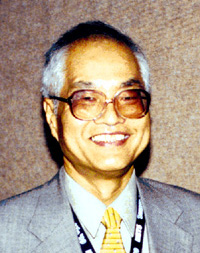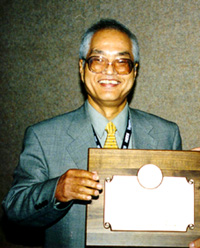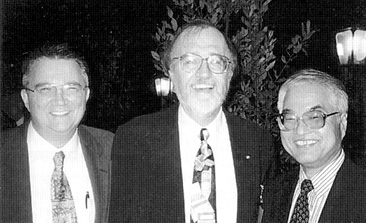
 |
Motohisa Kanda |
September 10, 1943 – June 12, 2000 |
Motohisa Kanda was born September 10, 1943 in Kanagawa, Japan to Saburo and Sachiyo Kanda. Though mischievous, he was an inquisitive and dedicated student who plowed through an engineering bachelor's degree in 1966. As an undergraduate, he met Yoko Umeda at a YMCA camp. With the caring support of his family in Denver, he came to the University of Colorado and earned his Masters (1968) and Doctorate (1971) degrees. After many years of courtship, Motohisa finally convinced Yoko to get married in 1971. They moved to Boulder and began their lifelong journey as best friends and enjoyed doing everything together.
In 1971, Motohisa joined the Radio-Frequency Technology Division (formerly Electromagnetic Fields Division) at the National Institute of Standards and Technology (formerly National Bureau of Standards) and served as group leader of the Fields and Interference Group for 15 years. Concurrently, he also served as a professor adjoint in the Department of Computer Engineering at the University of Colorado.
 |
As Editor of the IEEE's Transactions on EMC, Moto Kanda traveled the world seeking new and original material for the publication. On one such journey, he visited EMC'99 in Tokyo with his wife Yoko, left, and daughter Carol, center. |
 |
Moto Kanda received one of the EMC Society's highest awards at the 1999 IEEE International Symposium on EMC in Seattle. |
He was an IEEE Fellow, Life Member of the EMC Society, and Editor-in-Chief of the IEEE Transactions on EMC for 12 years. As a leader of EMC research at NIST, he wrote over 100 archival papers, and contributed to numerous EMC books and ANSI and IEEE standards. He was a technical member, vice-chair and technical program/paper committee chair of the IEEE EMC Symposium in Denver (1981, 1989, 1998). He served as Vice-Chair (1994-1996) and as Chair (1997-2000) of International Commission A (Electromagnetic Metrology) of the International Union of Radio Science (URSI). He received two Bronze Medals (1981, 1992) and a Silver Medal (1989) from the US Department of Commerce. Awarded three Transactions on EMC Best Paper Awards (1982, 1989, 1992), he became an Honorary Life Member is 1996. He received the Laurence G. Cumming Award in 1999 and numerous other awards and certificates of appreciation from the IEEE and the Department of Commerce. Motohisa took part in evaluating research results for the IEEE Transactions on EMC. He improved the quality of EMC Society publications with participation in several technical advisory committees.
Above all, Motohisa was a kindhearted brother, devoted husband, and loving father. He was a compassionate person who cared deeply about his family and friends. He provided unconditional love, support and guidance. We miss him and will never forget the memories.
Editor's Note: Len Carlson, Vice-President for Communication Services, EMC Society Board of Directors, attended the memorial service for Motohisa Kanda on Saturday, June 24 in Boulder. The Kanda family shared this material at the service.
 |
Moto Kanda enjoyed the company of the EMC Society Board of Directors and the Italian EMC community. He is shown at EMC '98 Roma with Board members Dick Ford (left) and Don Sweeney (center). |
Kanda-san; not even in my wildest dreams did I think that you would depart this world so quickly. I still don't believe it. Little did I realize that I was listening to your dying words when I called you from the airport while transferring between planes in the U.S in May.
I first met Dr. Moto Kanda in July 1982 in Tokyo at a seminar on EMC/EMI measurement technology where Dr. Kanda was the teacher and I was the student. This meeting occurred during a turning point in my career when I was changing my specialty from measurement standards to EMC. I was employed by Matsushita Communication Industrial Co., Ltd., and chairman of the EIA Japan Industrial Measurements and Standards Research Committee, so I was able to be of some slight help in the planning of Dr. Kanda's first seminar in Japan.
Thus it can be said that I became the first disciple of Dr. Kanda. When I recall how I brazenly prevailed upon Dr. Kanda to read my first paper at the IEEE International Symposium on EMC in 1983 in Washington, D.C., because it was not possible for me to go to the U.S. at the scheduled time, I want to find a hole and crawl in. In 1989, I presented my own paper in Tokyo, but subsequently there were many times when I took advantage of Dr. Kanda's good nature to have him read a paper for me.
Dr. Kanda not only taught me, but by his everyday conduct he continually delivered the following message to the worldwide electronics industry:
The proposal and establishment of EMC standards and regulations, together with their interpretation and administration for application to products and furthermore technology to secure conformance of products to these standards, are extremely important concrete endeavors. However, it is imperative to advance the underlying basic technology and pay attention to the theoretical analysis that is the basis for this technology.
By his actions Dr. Kanda put his words into practice. One example is the Kansai Electronic Industry Development Center. A great debt is owed Dr. Kanda for suggesting the technical seminars that have been held starting from 1996. In the past all activity had centered around manufacturers, including studies for setting standards and countermeasures for products, but Dr. Kanda taught us that it is necessary to fully consider the basic technology and established these seminars to provide a forum for information exchange with leading specialists from universities. These seminars have continued since then, and will continue into the future in memory of Dr. Kanda.
All my memories related to Dr. Kanda are happy ones. We shared similar tastes in food and thus I enjoyed Dr. Kanda's company while we dined together many times.
At this point I would like to relate an anecdote about Dr. Kanda's great appetite for rice. Dr. Kanda created the opportunity for me to participate at EMC Roma. He told me that I would find it extremely informative because the quality of papers is always very high, so I began participating in 1996. It was my first visit to Rome and Dr. Kanda guided me to many interesting places during breaks in the program.
Breakfast at the Hotel Atlantico was served buffet style and the menu included rice so we both dashed off to heap some on our plates. However, this rice was not cooked in a manner palatable to Japanese persons; it was prepared so that it was still half raw with a hard core. Perhaps it was just a bad batch. But I thought it would be wasteful to leave it on my plate and persevered until I finished what I had taken. I looked to Dr. Kanda and saw that he had not only eaten all that was on his plate but had returned for a second helping. He proclaimed, "I must eat rice or I won't be strong." Japanese people often say this. The second day I passed on the rice, but Dr. Kanda piled a double portion on his plate and ate it all.
I learned a lesson from this experience and in 1998 I carried rice in vacuum packs with me from Japan. Each pack contains a single portion and tastes like freshly cooked rice after it has been reheated in a microwave cooker for one or two minutes. In the morning I brought several of these with me to the hotel dining room and asked the waiter to heat them in a microwave, but he turned down my request by saying they had no such instant machine (micro-wave). Dr. Kanda refused to give up and negotiated to have the rice warmed in a microwave at a convenience store on a street corner a short distance away. We finally had hot, delicious rice. The next morning he again had the hotel send somebody to the convenience store to warm the rice and we had a delicious breakfast.
My memories also include the time he found vacuum packs of tofu (from Japan) at a Korean store and the two of us became emotional while enjoying delicious tofu, and the flavor of the shrimp we ate on Capri.
I still find it impossible to comprehend that health-food devotee Dr. Kanda could die of stomach cancer. EMC